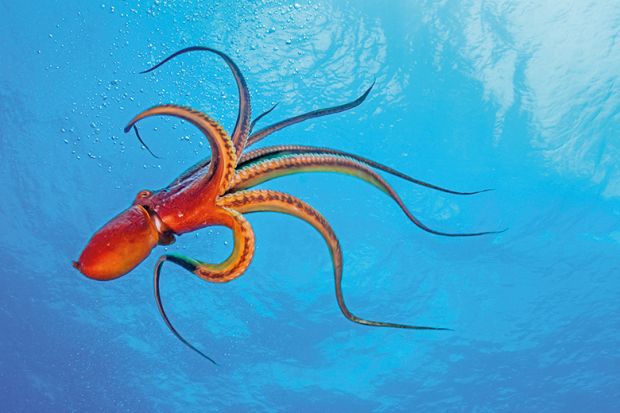For every question a biologist asks, God has chosen the best organism with which to answer it,” my Nobel prizewinning boss told me many years ago. My question was about the brain processes of learning and memory. I found that some of the most interesting experiments were being done with octopuses in a lab in Naples, so I took myself off there to work with these strange animals, which could be taught how to distinguish shapes and patterns for food rewards. Alas, their behaviour was too complicated for the simple questions I was asking, and I abandoned them for more tractable creatures.
If only this book had been available all those years ago, I might not have given up so soon. Australia-based Peter Godfrey-Smith is a philosopher with a deep knowledge of biology and a passion for scuba diving. His dives have taken him to a sheltered site at which large numbers of octopuses congregate, living on the sea floor in dens made out of scallop shells. He calls it Octopolis, and he has spent many hours watching and interacting with its inhabitants. Masters of disguise, the octopuses hide almost unseen, their shell-less bodies capable of extraordinary contortions, their eyes constantly on the watch, and their eight arms always ready to reach out, feel, grasp and explore their surroundings – including passing divers.
Godfrey-Smith’s interest in the octopus goes beyond mere fascination. Octopuses are uniquely intelligent among invertebrates – easily on a par with mammals such as dogs and cats. They can learn and remember, and Godfrey-Smith suggests that they might even have some form of autobiographical memory of their own past. But their brains are unlike those of any vertebrate: not just clustered in a mass of interconnected neurons in their heads but widely distributed. Their arms are packed with neurons – each individual sucker on the arm may have 10,000 of them, enabling touch and taste – and the arms behave in many ways as if they have independent “minds” of their own.
This, for the philosopher, poses an irresistible question: what is it like to be an octopus? And what can these strange, distributed minds tell us about our own? The fossil evidence reveals that the evolutionary paths that led to vertebrates and humans on the one hand and cephalopods such as the octopus on the other forked and diverged from their last common ancestor some 600 million years ago. Neurons and primitive nervous systems were present before the fork; but after it, brains and all that goes with them evolved quite independently in these two very different living forms. Octopuses are the nearest we get on Earth to the intelligent aliens beloved (or feared) in science fiction. They may not be God’s organisms to manipulate and experiment on in the lab, as part of humanity’s attempts not merely to understand but to dominate nature. But they deserve our respect and awe – yet, as Godfrey-Smith warns us, our ongoing pollution of the oceans risks destroying them.
This is a delightfully written book and a model of engaged science writing. Godfrey-Smith handles both the biology and the philosophy profoundly but without ever talking down to his audience. I only wish I could join him on his dives into Octopolis.
Steven Rose is emeritus professor of neuroscience, The Open University.
Other Minds: The Octopus and the Evolution of Intelligent Life
By Peter Godfrey-Smith
William Collins, 272pp, £20.00
ISBN 9780008226275
Published 9 March 2017
POSTSCRIPT:
Print headline: Eight arms and many brains
Register to continue
Why register?
- Registration is free and only takes a moment
- Once registered, you can read 3 articles a month
- Sign up for our newsletter
Subscribe
Or subscribe for unlimited access to:
- Unlimited access to news, views, insights & reviews
- Digital editions
- Digital access to THE’s university and college rankings analysis
Already registered or a current subscriber? Login




